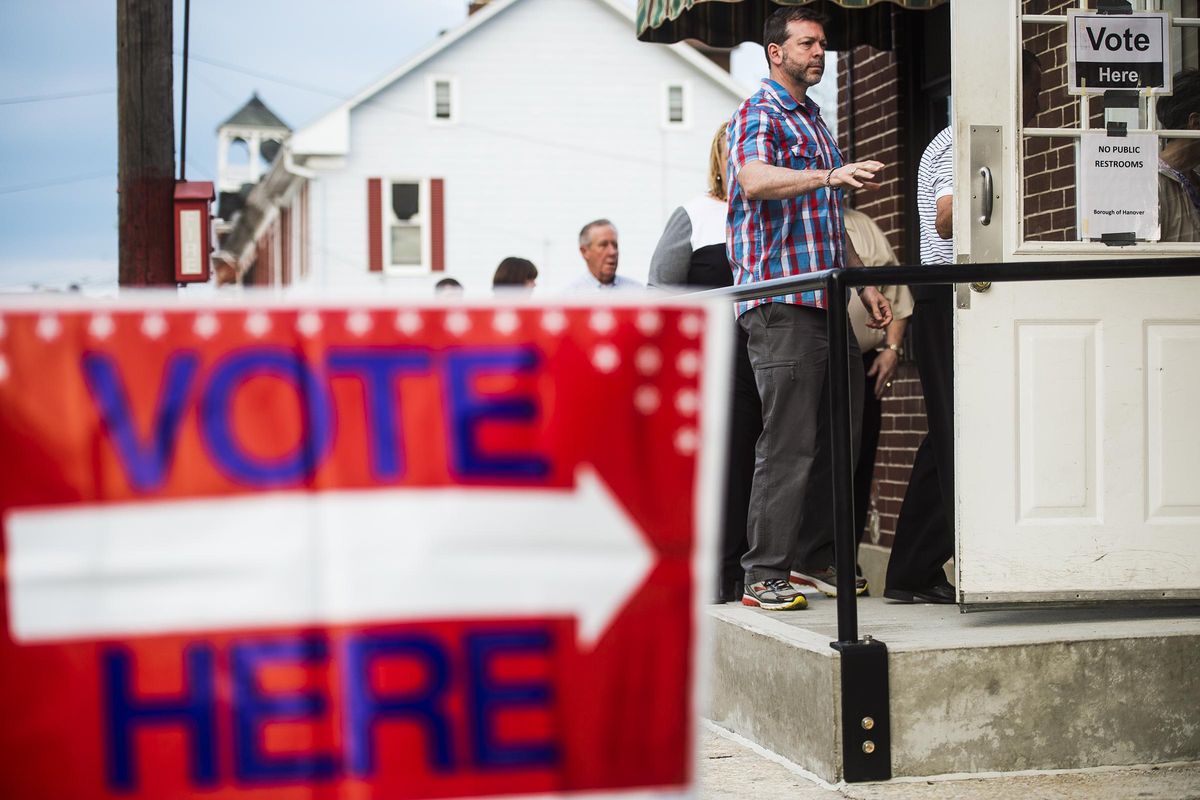Exit poll: Donald Trump, Hillary Clinton draw support of broad coalitions
Republican presidential candidate Donald Trump speaks during a primary night news conference, Tuesday, April 26, 2016, in New York. (Julie Jacobson / Associated Press)
WASHINGTON – Donald Trump attracted a broad coalition of Republican voters as he won presidential primary elections in Connecticut, Maryland and Pennsylvania on Tuesday, pulling in support across income groups, from men and women and from those who want a candidate who will shake things up.
Trump also won the GOP primaries in Delaware and Rhode Island, two states where exit polls were not conducted.
On the Democratic side, former Secretary of State Hillary Clinton drew overwhelming support from women and black voters as she beat Vermont Sen. Bernie Sanders in the Maryland, Connecticut and Pennsylvania primaries. Clinton also won in Delaware, while Sanders took Rhode Island.
In Pennsylvania, most Democratic voters in the state said they’ve been energized by the primary battle between Clinton and Sanders. But most GOP voters believe the heated contest among Trump, Texas Sen. Ted Cruz and Ohio Gov. John Kasich has divided their party.
Those were among the findings from exit polls conducted for The Associated Press and television networks by Edison Research.
Other highlights from the exit polls:
Trump’s coalition
Trump won across nearly all demographic groups –gender, education and income levels alike– in Connecticut, Maryland and Pennsylvania. With the exception of the youngest voters in Maryland, he won all age groups in each state.
The billionaire businessman also did well with those most concerned about the state of the U.S. economy, and he bested Cruz and Kasich with voters who want the next president to tell it like it is or bring needed change to the country.
Overall, a large majority of Republican voters in all three states want the candidate with the most votes in the primaries to prevail at the party convention in Cleveland – and most of them supported Trump.
Republican voters who think Wall Street hurts the economy were especially likely to support Trump in all three states. And in Pennsylvania, two-thirds of GOP voters who said that trade with other countries takes jobs from American workers voted for Trump.
Clinton’s victories
In Maryland, Connecticut and Pennsylvania, Clinton was supported by large majorities of black voters, most women and those looking for an experienced candidate. Democratic voters in all three states also saw her as the best candidate to beat Trump.
In Connecticut, where 20 children and six adults were killed in a 2012 mass shooting at Sandy Hook Elementary School, 6 in 10 Democratic voters said they thought Clinton would do a better job handling gun policy.
Clinton eked out a victory in the state, taking voters 45 and older and those living in households making more than $100,000 per year. More than 4 in 10 Connecticut Democrats fell into that category. Among those in households making more than $200,000 per year, two-thirds supported Clinton.
Sanders won a majority of men and drew the support of younger voters.
Anti-Cruz voters
For Cruz, it was a rough night. Four in 10 in Connecticut, a third in Pennsylvania and three in 10 in Maryland said they wouldn’t vote for Cruz if he was the GOP nominee. And in Pennsylvania, nearly 6 in 10 said they would be either concerned or scared about a Cruz presidency.
Still, most Republicans in Connecticut, Maryland and Pennsylvania said they are voting for their candidate, rather than against his opponents.
Only a quarter of voters in Connecticut and Maryland said they voted for someone because they opposed the other candidates. And in Pennsylvania, just one in five said they were casting a negative vote.
In Pennsylvania, Trump was more polarizing than either of the other candidates. While over a third of GOP voters said they would be excited by a Trump administration, nearly 4 in 10 said they would be scared or concerned.
Energy for Dems, division for GOP
Most Democratic voters in Pennsylvania say they’ve been energized by the closely contested primary between Clinton and Sanders.
But Pennsylvania Republicans say the opposite about the heated contest among Trump, Cruz and Kasich.
About seven in 10 voters in Pennsylvania say the Democratic campaign has energized the party rather than divided it, while about 6 in 10 GOP voters say the Republican campaign this year has divided the party. Only 4 in 10 Republican voters say they’ve been energized.
The surveys were conducted for The Associated Press and television networks by Edison Research as voters left their polling places at 25 to 35 randomly selected sites in Pennsylvania, Connecticut and Maryland. Preliminary results include interviews with 1,223 to 1,313 Democratic primary voters and 745 to 1,228 Republican primary voters in each state. The results among all those voting in each contest have a margin of sampling error of plus or minus either 4 or 5 percentage points.
- - - - -
Updates with Clinton’s Connecticut victory, new survey data.




















